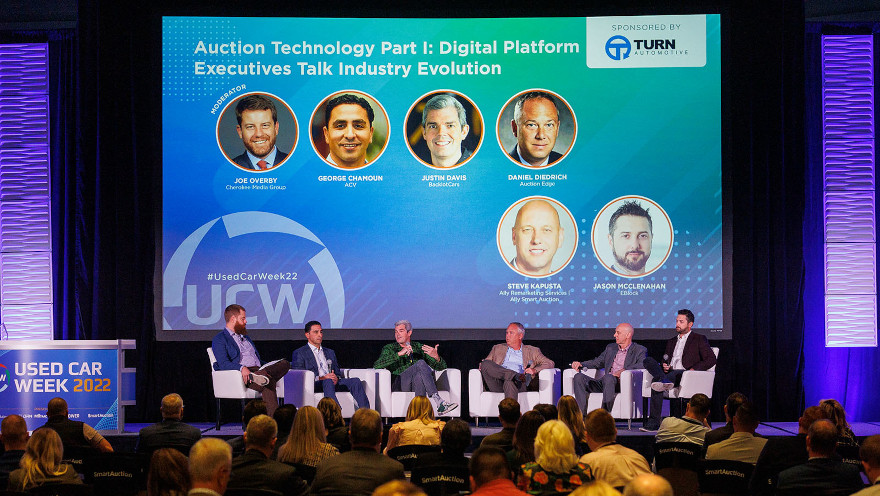Digital technology is revolutionizing the auction process from beginning to end

The “Auction Technology Part I: Digital Platform Executives Talk Industry Evolution” session at Used Car Week. Photo by Jonathan Fredin.
By subscribing, you agree to receive communications from Auto Remarketing and our partners in accordance with our Privacy Policy. We may share your information with select partners and sponsors who may contact you about their products and services. You may unsubscribe at any time.
SAN DIEGO –
Digital technology is revolutionizing the auction process, making it much more efficient and accurate, said participants on two panels during Used Car Week.
The move to a fully digital auction process is inexorable, said Steve Kapusta, who is senior vice president of Ally Remarketing Services at Ally SmartAuction.
“You can’t slow (it) down. It is seamless and simple,” he said.
Kapusta was a panelist at the “Auction Technology Part I: Digital Platform Executives Talk Industry Evolution” session.
Ally’s SmartAuction internet platform, which Kapusta oversees, allows sellers from a swath of industries to sell used vehicles to franchised and independent dealers.
The purpose of digital auctions is to make the auction process easier across the board, including before and after the auction itself, said panelist Justin Davis, president of BacklotCars, a dealer-to-dealer digital wholesale marketplace.
Subscribe to Auto Remarketing to stay informed and stay ahead.
By subscribing, you agree to receive communications from Auto Remarketing and our partners in accordance with our Privacy Policy. We may share your information with select partners and sponsors who may contact you about their products and services. You may unsubscribe at any time.
BacklotCars includes an auction platform with inventory from new-car dealerships, inspection, financing, and transportation all on one site.
“We are making everyone’s life easier,” he said.
EBlock, a platform with both live and timed digital auctions, an assurance program, and detailed third-party condition reports aims to give customers maximum flexibility.
“Don’t force a customer in one certain direction,” says president and CEO Jason McClenahan. “Embrace the evolving needs of the customer,” he advised.
Vehicle inspection has been radically transformed by digital technology. Gone are the days when a buyer needed to “kick the tires” of a vehicle to determine its condition.
But is it better to invest in developing one’s own digital inspection technology, or to acquire it?
ACV has done both. It employs more than 30 software engineers working on inspection, said CEO George Chamoun.
It also has acquired core capabilities. For example, in February ACV bought Monk, an AI-powered vehicle self-inspection company.
“Assets like Monk are so far ahead in terms of self-inspection,” he said.
Independent auctions are quickly moving into the digital space. They can be agile and flexible and “don’t have a religion on a certain platform or place,” said panelist Daniel Diedrich, CEO of Auction Edge, a tech provider for independent auctions.
They have a “direct line to the owner that is hard to reproduce,” he said.
Digital platforms give independent auctions a national reach and bring “trust and transparency” to the process, said Backlot Cars’ Davis. “We are just scratching the surface,” he said.
There is a huge total addressable market in the wholesale auction space, said Chamoun. On the commercial side alone, more than 10 million cars are being sold to dealers, he pointed out.
But the auction market is very fragmented. That will attract investors, he said, because “investors love fragmented industries.”
There is a still lot of room for innovation in the wholesale auction space, said EBlock’s McClenahan.
“I believe the auction ecosystem has a lot of evolution to do. Technology can be part of that,” he said.
One area that is evolving rapidly because of artificial intelligence is the inspection space, said panelists at the “Artificial Intelligence and the Auto Remarketing Revolution” session.
An assessment using AI is location agnostic, takes less than 1.5 minutes to complete using any camera-enabled device; and “reduces subjectivity,” said panelist James Spears, head of automotive at Tractable
Tractable has an application which can value, inspect, and appraise vehicles remotely.
The technology offered by Tractable and similar companies allows users to better make the right decision as to what is the optimal outcome for vehicle, said Spears. Up to 98% of recommendations go into the right channel, he said.
Tractable’s software can even detect cosmetic damage, said panelist Ryan Grodzki, Tractable’s AI Inspection SME, Director of Business Development.
And it is calibrated to individual use cases, such as an insurance company versus an auction house, he added.
AI “removes moments of uncertainty. There is more trust and value,” said Spears.
But humans still need to be part of the process at some point, or important elements will be missed, “such as odors,” he said.


